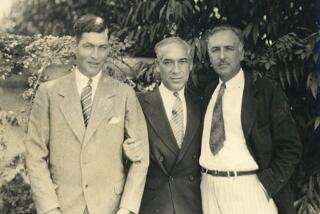MOVIE REVIEW : ‘Chattahoochee’: Better Never Than Late
- Share via
Why an actor or a director--or a writer--would be drawn to certain material is sometimes hard to fathom. In the case of “Chattahoochee” (Mann’s Plaza), the murkiness has to do with the subject: violent abuses of the American mental hospital system in the mid-1950s.
Why a noted British television director, Mick Jackson, would leap on this subject as his first feature film/first American feature is a mystery. If he is drawn to themes of social relevence, aren’t there any God’s quantity of contemporary injustices to wax indignant about, roughly one for every film director alive today?
It’s understandable why British-born Gary Oldman might want his role; turning Southern Fundamentalist is another test of his unerring ear and he gets to play a hospital-imprisoned martyr complete with Christ-like visual symbolism. Somehow you suspect that references to “One Flew Over the Cuckoo’s Nest” were thrown about more than once when Oldman was being lured aboard this project.
Well, actors thrive on challenge and Oldman conquers every one that “Chattahoochee” throws at him (it’s MPAA-rated R for brutality and madhouse menace), including acting through a beard modeled after the Smith Brother on the right. What he can’t lick is the fact that the movie’s revelations feel about 40 years out of date--right up there with Anatole Litvak’s 1948 shocker, “The Snake Pit.” And what there is to the story that’s current and applicable, the fact that Oldman’s Korean War veteran is suffering post-traumatic shock, is never brought out by this screenplay.
Oldman plays Emmett Foley, a “certified hero” of the Korean War who succumbs to inner pressures one morning and begins shooting up his small Florida town, mostly firing into the air but winging one neighbor in the melee. He finishes with a less-than-successful suicide attempt; aiming for his heart he fires into the right side of his chest.
Tossed into the Chattahoochee hospital, a maximum security pen for the criminally insane, Foley finds himself in bedlam--or “Frances,” or “The Music Lovers” or any of the dozens of movies about the sane and the insane with sadistic guards and punitive, unbelieving doctors. Solitary confinement, vicious reprisals and methods of punishment refined in “The Bridge on the River Kwai” or “Cool Hand Luke” are the order of the day. However, no one will ever confuse James Hicks’ dogged, savorless script with a single one of those films, not even “Bedlam” (1948).
Foley’s fiercely supportive sister, a nicely shaded performance by the splendid Pamela Reed, is his only link to the outside. His dreamy, ditsy wife, Frances McDormand (memorable in “Mississippi Burning”), remarries and has their daughter raised by her stepfather.
Fellow inmates are played compassionately by Dennis Hopper and M. Emmet Walsh, but there isn’t a surprise in a wagonful as Foley painstakingly finds habeas corpus and, finally, his way to the front gate.
“CHATTAHOOCHEE”
A Hemdale Releasing Corp. Presentation. Producers Aaron Schwab, Faye Schwab. Executive producers John Daly, Derek Gibson. Director Mick Jackson. Screenplay James Hicks. Co-producer Sue Baden-Powell. Production designer Joseph T. Garrity. Editor Don Fairservice. Camera Andrew Dunn. Music John Keane. Costumes Karen Patch. Art director Patrick Tagliaferro. Sound Ed White. With Gary Oldman, Dennis Hopper, Frances McDormand, Pamela Reed, Ned Beatty, M. Emmet Walsh, Matt Craven, Timothy Scott. Running time: 1 hour, 43 minutes.
MPAA-rated: R (under 17 requires accompanying parent or adult guardian).
More to Read
Only good movies
Get the Indie Focus newsletter, Mark Olsen's weekly guide to the world of cinema.
You may occasionally receive promotional content from the Los Angeles Times.









